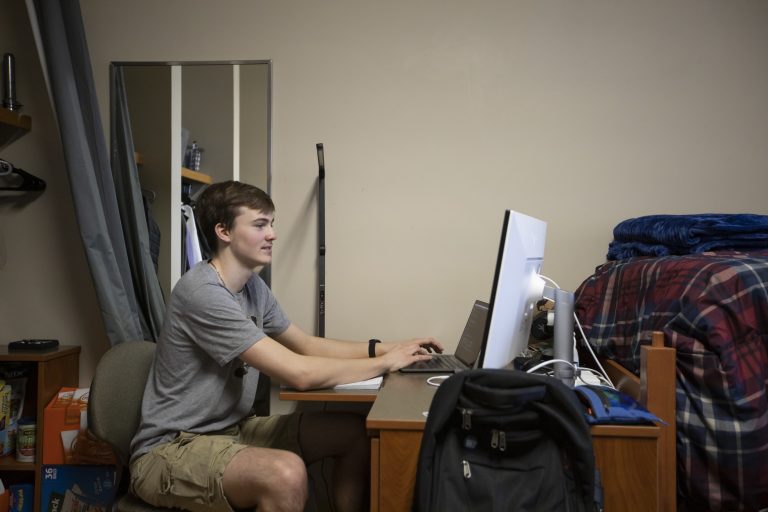Show me your best writing

By Cary Littlejohn
Jaylon Vaughn couldn’t quite believe his eyes. He’d just gotten feedback on a personal statement for the National Science Foundation (NSF) Graduate Research Fellowship Program (GRFP) he’d submitted to the Writing Center.
“When I started the online submission, I did it because I was expecting run-of-the-mill feedback,” Vaughn, 23, said. “Honestly, I just thought I was going to get corrections on my grammar.”
What he got instead was something quite different.
“They wrote me a letter,” he said of the online written response with a laugh. “I submitted a three-page document, so why is it four, almost five now?”
The reason was simple: A Writing Center tutor had responded to Vaughn’s online submission with a thorough review that went much deeper than corrections of grammar.
“It really opened my eyes,” Vaughn said. The comments barely touched on grammar at all; they were much more comprehensive than that. They went to structure and provided approaches he hadn’t considered before.
He appreciated an outside perspective on his writing, especially from those without a scientific background.
“Just like in evolution, new things have to be introduced for things to change and get better and subsequently grow into something new, into something more productive,” Vaughn said. “That’s why I feel the Writing Center was useful to me.”
The online treatment of Vaughn’s personal statement is just one example of the services offered by the Writing Center. In addition to accepting asynchronous online submissions around the clock, it also conducts one-on-one in-person tutoring sessions, as well as virtual sessions.
After applying the feedback from the online submission, Vaughn scheduled multiple in-person sessions to improve his personal statement.
During the 2021-22 academic year, the Writing Center provided its services to more than 4,300 students over more than 12,000 hours of tutoring. Of those hours, almost 2,400 of them were dedicated to application materials.
The Writing Center’s help with NSF GRFP applications like Vaughn’s ensures students get individualized guidance as the university strives to increase applications, said Erik Potter, program manager of the Global and National Fellowships Office.
The NSF GRFP seeks to ensure the quality, vitality and diversity of the scientific and engineering workforce and offers around 2,000 three-year fellowships that include a $37,000 stipend per year.
“Having NSF funding, as a graduate student, puts you on the fast track for future government funding, from NSF or anywhere else,” Potter said. “It is a tremendous predictor of future success.”
NSF GRFP applications are comprehensive and complicated, Potter said.
“You’re putting together a holistic package that shows your development as a scientist but also as a human,” he said. It’s a combination of background, educational experiences, interests and more coalescing into “a particular testable scientific question.”
While the university increases its focus on NSF GRFP applications, there remain other prestigious programs for which students can apply, including well-known ones like the Rhodes and Fulbright scholarships. The Writing Center helps with those applications as well.
Maya Ganapathy, a 26-old-year graduate student in veterinary public health, is in the process of applying for a Fulbright scholarship. She decided to use the Writing Center’s online submission option.
“The requirements for Fulbright were both rigid but also vaguely loose at the same time,” Ganapathy said. “I had never written in a creative fashion, so having to write a story in my personal statement and not just list out my accomplishments was weird.”
Thus began a back-and-forth with the Writing Center. She consulted with a tutor via Zoom to talk through her research proposal and submitted both the proposal and her personal statement upwards of a dozen times, gaining new insights with each submission.
The feedback she received was “kind of brutal, but in a good way,” Ganapathy said. “I didn’t realize how much the Writing Center at Mizzou did. Like, how much work they were willing to do.”
“May you never write alone.” That’s the Writing Center’s commitment to all students across the university. That motto is exemplified in Vaughn’s and Ganapathy’s experiences and countless others just like them. Neither of them had ever used a writing center’s services before, but both, as they reflected on their recent experiences, wished that they had. Writing alone, it turns out, isn’t the only option, and the Writing Center ensures Mizzou students never have to.